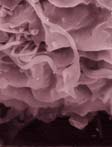 It's
in the Blood "Signal transduction involves many different pathways within the cell, and when one pathway is disrupted, disease is the result," says Tuscano, who splits his time between clinical practice and research. "We're interested in why abnormal signals cause diseases like cancer, and how we can manipulate the pathways to treat them more efficiently. " One discovery that Tuscano participated in was the development of antibodies that affects the growth of cells in B-cell lymphoma. Antibodies are unique proteins produced by the body that attach to a specific antigen (in this case, cancer cells) with a lock-and-key type of mechanism. Scientists are able to create single antibody-secreting cells so that they can create unlimited amounts of antibodies. They're often referred to as monoclonal antibodies because they are identical, that is, cloned from one source. As an added benefit, because they target cancer at the molecular level, monoclonal antibodies tend to have fewer side effects than other treatments. Tuscano helped develop several antibodies when he was a fellow working at the National Institute of Allergy and Infectious Diseases with director Dr. Anthony Fauci. The antibodies attach to a receptor protein called cd-22, which is found only in B-cells. In mice and tissue studies performed at UC Davis Medical Center, cd-22 caused normal B cells to grow while killing cancerous B-cells. That's a potential improvement over the current best monoclonal antibody treatment, a drug called Rituxan, which kills B-cells, healthy and unhealthy alike, by targeting cd-22. "People can probably live without B-cells, although they'll be more susceptible to infection," Tuscano observes. "But in a perfect world you'd want a cancer drug that didn't harm your healthy B-cells at all."
Home |
Table of Contents |
To our Readers |
Building on Basics UC Davis Health System | © 2000, 2001, 2002 UC Regents. All rights reserved. |
Research by Joseph Tuscane is shedding light on how healthy B cells become cancerous. |

